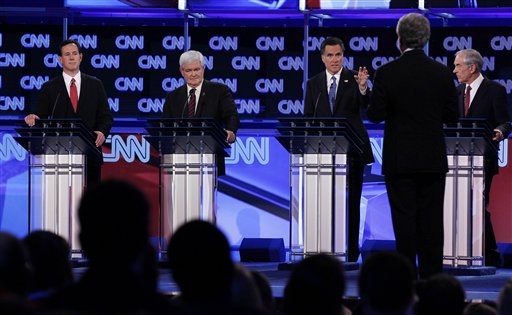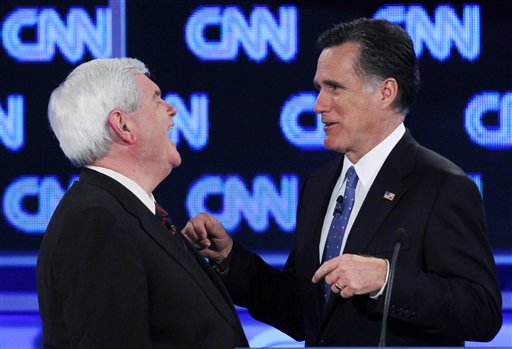WASHINGTON — The pitch from the Republican presidential contenders to voters sounds a lot like the children’s game of follow the leader.
When Mitt Romney and Newt Gingrich aren’t puffing up their own leadership credentials, they’re running down the leadership skills of one another and of President Barack Obama.
If anyone missed Monday’s conference call from the Romney campaign about Gingrich’s record as a “failed leader,” not to worry. They could have tuned in to Tuesday’s conference call. Or Wednesday’s. Or Thursday’s. Or checked out the “unreliable leader” banner splashed across a Romney news release that labeled Gingrich “unhinged.”
Romney’s political biography, meanwhile, is all about his leadership as a businessman, Massachusetts governor and savior of the 2002 Olympic Games in Salt Lake City.
It’s hard to miss Gingrich’s frequent broadsides at Romney for failing to provide consistent, visionary leadership. Or the former House speaker’s pronouncements that he, by contrast, offers “exactly the kind of bold, tough leader the American people want.” Or Gingrich’s descriptions of all that was accomplished in his four years as speaker in the 1990s.
Former Pennsylvania Sen. Rick Santorum, trailing in the polls, keeps trying to muscle his way into the conversation by offering himself as the steady bet who can be counted on to offer more reliable conservative leadership than “erratic” Gingrich or “moderate” Romney.
In a race where all the candidates are trying to out-conservative one another, stressing leadership credentials gives the GOP rivals a way to try to distinguish themselves. In a year when Obama’s own leadership skills are seen as one of his weakest qualities, it gives the Republicans one more arrow in their quiver as they argue over who would be most electable in a matchup with Obama come November.
Leadership is always a part of the equation in presidential elections. In 2008, for example, the candidates all were abuzz with claims that they offered “transformational” leadership.
“I want to transform this country,” Obama said when he announced he was running.
This year, leadership is getting an extra dose of attention, perhaps because of statistics such as this: The share of Americans viewing Obama as a strong leader slipped from 77 percent at the start of his presidency to 52 percent in a Pew Research Center poll released this month. Among Republicans, only about one-fourth of those surveyed in the most recent poll said Obama was a strong leader, compared with 80 percent of Democrats.
At a campaign debate last week in Tampa, Fla., Gingrich and Romney both turned a question about electability into an answer about the L-word.
“This is going to come down a question of leadership,” Romney said. Then the former Massachusetts governor recited his track record as a leader in business and government and took a dig at Gingrich for having to “resign in disgrace” when he was speaker in the 1990s.
Gingrich, answering the same question, aligned himself with the leadership record of conservative hero Ronald Reagan and offered himself as someone “prepared to be controversial when necessary” to bring about great change.
The answers offer a window into how differently the two candidates define leadership: Romney more as a manager with business school credentials, Gingrich more as a big-thinking visionary.
The leadership argument is a particularly potent campaign weapon for Romney because a number of Republicans who served in Congress with Gingrich have been happy to describe his shortcomings in running the House.
“If you were somebody trying to serve with him, you were always sort of left standing with your hands empty in terms of moving forward with an actual plan or putting a plan to paper,” Rep. Mary Bono Mack, R-Calif., said of Gingrich on a Romney campaign conference call Thursday. “So for me, it’s an example that he’s just not an effective leader. I think Mitt has the temperament and the ability to lead.”
Gingrich, who resigned after a spate of ethics problems and a poor showing for House Republicans in the 1998 elections, managed to turn even his resignation as speaker into evidence that he’s a strong leader.
“I took responsibility for the fact that our results weren’t as good as they should be,” he said in the Tampa debate. “I think that’s what a leader should do.”
As for the turbulence of his tenure as speaker, Gingrich casts that, too, as evidence of his bold leadership.
“Look, I wish everybody had loved me, but I’d rather be effective representing the American people than be popular inside Washington,” he said earlier in the campaign.
Stephen Wayne, a presidential scholar at Georgetown University, said the harsh judgment of Obama’s presidential leadership by Republicans and even some Democrats in part is due to the high hopes that he raised during the 2008 campaign. Obama the president has been measured against the words of Obama the candidate ever since.
Now that it’s campaign season again, says Wayne, “he’s not competing against his own image, he’s competing against a real life person that has frailties. … In a sense, that lowers the bar for Obama.”
Send questions/comments to the editors.




Comments are no longer available on this story